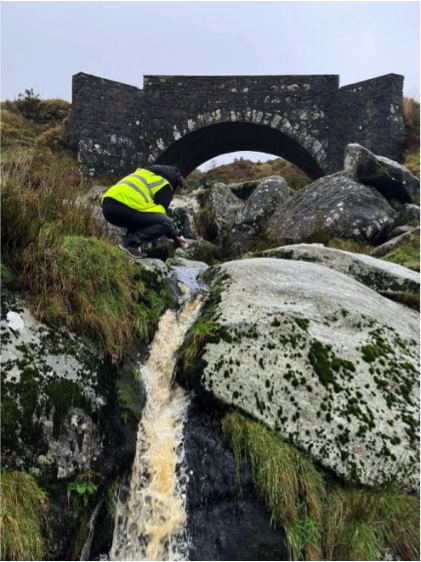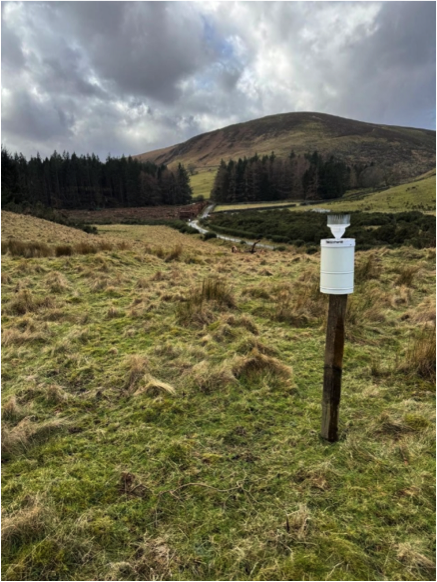Zenobia Kusi-Afrakoma & Dr Pete D. Akers, 25/09/2025
Uncovering Ireland’s Water Stories Through Isotopes
When we think of Ireland, we picture rolling green fields and abundant rainfall. Yet within this familiar landscape lies a fragile and complex system: our blanket bogs. Covering almost 3.6% of Ireland’s land area, these peatlands are not only iconic features of the Irish countryside but also vital ecosystems. They store vast amounts of carbon, regulate water, shelter biodiversity and hold past climatic data. However, climate change and human pressure are putting them at risk.
My PhD research, ‘Developing a new isotopic framework to interpret water stable isotopes, with insights from Irish precipitation, bog surface water and blanket bog peat cores’, asks a deceptively simple question: what stories does water tell us about the past, present and future of these ecosystems?
The answer lies in the chemistry of water itself. Rain, bog water, and even the peat itself carry unique ‘isotopic fingerprints’ that reflect the weather and environmental history of the water. By studying the stable isotopes of oxygen and hydrogen, we can trace how water moves through the environment, where it comes from and how it changes under the influence of evaporation, storms or drought. These isotopic clues are powerful because they help us understand both short-term weather variability and long-term climate shifts.
Ireland is an ideal natural laboratory for investigating water systems. With a maritime climate shaped by the Atlantic Ocean, frequent rainfall and seasonal variability, it offers a well-suited setting to explore how global climate systems interact with local water cycles. Precipitation water isotope data in Ireland are currently only monitored and reported from Valentia Observatory once a month. As part of my research, the Irish Network for Isotopes in Precipitation (ÉireNIP) has been initiated with precipitation collectors stationed at three Dublin-area sites and at one site in the Wicklow Mountains to support data from the Valentia Observatory.
Figure 1. Stream flowing through a blanket bog in the Wicklow Mountains.
Alongside precipitation collection, I am sampling the water isotopes of the bog stream network of the Clohogue River catchment in the Wicklows each month to learn how isotopic signals in precipitation are transferred into surface water systems. My research brings together these datasets to tackle five key challenges:
Understanding how climate and atmospheric drivers shape isotopes in Irish rainfall.
Comparing precipitation and bog water to see how isotopes reflect environmental indicators and water quality.
Extracting isotope profiles from peat cores, which act as natural archives, to reconstruct past changes in moisture sources and evapotranspiration.
Building a practical interpretive framework that connects all these insights for real-world use.
Figures 2 & 3. Blanket bogs (on the left side) and precipitation collector (on the right side) in the Wicklow Mountains.
The ultimate goal is not just scientific discovery, but impact. By linking isotope data with water quality indicators, my work provides tools to detect hydro-chemical trends in bog catchments. This is vital for water managers, conservationists and policymakers working to safeguard clean water, restore peatlands and prepare for climate change.
My research shows how tiny isotopic variations in water molecules can help answer big questions about climate resilience, environmental sustainability and Ireland’s future. Just as bogs preserve centuries of history in their layers, isotopes preserve hidden stories about our changing climate and environment.
ÉireNIP call: We are seeking collaboration with organizations or individuals in the Midlands, Southern and Western parts of Ireland who are interested in hosting a precipitation collector. This initiative will provide us with the opportunity to examine isotopic patterns across the Island. If interested, please contact:
Zenobia Kusi-Afrakoma: kusiafrz@tcd.ie
/ Dr Pete D. Akers pete.akers@tcd.ie
This research is funded by Research Ireland as part of the DRYPEAT project.
Zenobia Kusi-Afrakoma
Zenobia Kusi-Afrakoma is a water resource specialist and PhD researcher passionate about building sustainable, science-based solutions to today's most urgent water and climate challenges. She is pursuing research in the department of Geography under the supervision of Dr Pete Akers in Trinity College Dublin, focused on water stable isotopes and water quality indicators in Irish peatlands, which are critical ecosystems for carbon storage and hydrological balance. Her research supports the development of evidence-based frameworks to improve water resource management in the context of environmental change.






